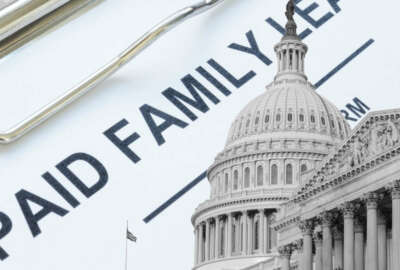Federal employees may be close to a new benefit that some lawmakers and employee groups have been fighting for nearly a decade.
Congress and the White House have reached a tentative deal to include up to 12 weeks of paid parental leave in the upcoming National Defense Authorization Act, which lawmakers are supposed to consider as soon as this week.
“We may not have the whole thing,” Sen. Chris Van Hollen (D-Md) said Monday of the agreement at a townhall at the Food and Drug Administration with members of the National Treasury Employees Union. “But I do believe we’re close, at least on the parental leave portion. If we’re successful here, federal employees would receive 12 weeks of parental paid leave. We’ll then have to work on the other piece, the medical leave piece.”
The Wall Street Journal first reported Congress and the White House were close to a deal on paid leave for federal employees in the defense authorization bill. The Washington Post first reported the White House was willing to move on the paid leave program in exchange for the president’s proposed Space Force.
New House Oversight and Reform Committee Chairman Carolyn Maloney (D-N.Y.) and Majority Leader Steny Hoyer (D-Md.) have advocated for a federal paid parental leave program for years. They, along with Reps. Jennifer Wexton and Don Beyer (D-Va.), introduced the Federal Employee Paid Leave Act as a standalone bill in March.
The House included and then passed the bill as part of its version of the defense authorization bill. The Senate’s version of the NDAA, however, didn’t include this particular leave proposal, leaving congressional leadership to conference over the matter.
The latest agreement, however, doesn’t completely match the original legislation as envisioned by Maloney and other House Democrats. The bill was supposed to grant up to 12 weeks of paid leave for federal employees to witness the birth, adoption or fostering of a new child — and care for a new child or family member with a serious medical condition.
The leave also would have applied to federal employees with a serious medical condition who needed time to recover.
“I’m confident, but it’s not over until it’s over,” Van Hollen said of the NDAA agreement in a conversation with reporters. “But the good news is that we’ll at least provide 12 weeks of paid parental leave and then we’ll continue to work on the other piece. Republicans continue to resist this; it’s just because the president wanted his Space Force that they were willing to reach an agreement here. Let’s see how all this shakes out. Until the ink is dry it’s not over.”
A federal paid parental leave program does appear to have at least some bipartisan support.
55 House members, including 2 Republicans, urged armed services leadership in August to include the paid family leave program in the final 2020 defense authorization conference report.
And four Republican senators, including Shelley Moore Capito (Wyo.), Susan Collins (Maine), Lisa Murkowski (Alaska) and Rob Portman (Ohio), all voted back in September on a measure to insist conferees debate the paid leave issue in NDAA conversations. That motion failed by a narrow 47-48 vote.
The final NDAA conference report is expected later on Monday, and the House is expected to take up the sweeping authorization bill later this week.
The Senate also must vote and clear the measure before sending it to the president’s desk for his signature.
The National Active and Retired Federal Employees (NARFE) Association, which has also long advocated for a paid leave program, applauded the news an agreement had been reached.
“This policy is not only about the value we place on family, but also smart human resource management,” Ken Thomas, NARFE national president, said in a statement Monday. “The bonding time it affords federal employees with a new addition to their family is priceless, as is the government’s ability to recruit and retain top talent and a high-performing workforce that best serves the American people. With every other industrialized country providing paid parental leave to citizens, and America’s top 20 companies offering some amount of it to their employees, this policy is long overdue, but no less important.”
The House Oversight and Reform Committee is expected to hold a hearing Tuesday on a national, comprehensive paid family and medical program.
Copyright
© 2024 Federal News Network. All rights reserved. This website is not intended for users located within the European Economic Area.
